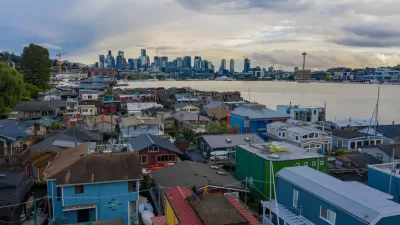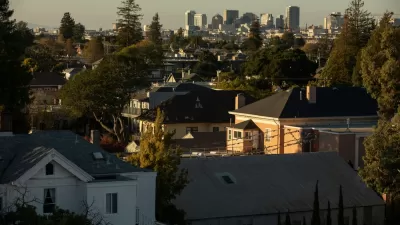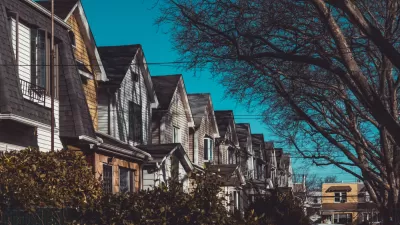The historically comprehensive study outlines the policies that have shaped homeownership, generational wealth, and economic development in the Puget Sound region.

A new report from the Puget Sound Regional Council (PSRC) connects single-family zoning to structural racism in the region, reports Shaun Kuo in The Urbanist.
Unlike previous studies of the issue, Kuo notes, the Legacy of Structural Racism Interactive Report “provides a high-level overview and collection of resources on this history of structural racism in the Puget Sound region. It is also authored by a government agency that is key to the long-range land use, transportation, and economic planning of the Puget Sound region and is empowered with the distribution of federal funding.”
The report outlines the region’s history dating back to the 1700s, highlighting the removal of Native Americans, the expulsion of Chinese people, and other racially motivated events in the area’s history up to and including 20th century redlining and its lingering modern-day effects.
“This report does much to pair the historic suppression of nonwhite wealth building with the retention of land use policies that increase the cost of homeownership. It demonstrates the legacy of these practices in the massive wealth gap between White and Black households, wherein for every dollar a White family has, a Black family has a little more than 10 cents.”
The report also notes the impact of highway construction on primarily poor and non-white neighborhoods. “PSRC’s report discusses how whiter and wealthier neighborhoods like Mercer Island were able to get highway lids and public parks to mitigate highway construction. Meanwhile, neighborhoods like the Chinatown-International District were denied mitigation.”
See Kuo’s article for more details and a link to the full report.
FULL STORY: PSRC Report Connects Single Family Zoning and Highways with Structural Racism

Alabama: Trump Terminates Settlements for Black Communities Harmed By Raw Sewage
Trump deemed the landmark civil rights agreement “illegal DEI and environmental justice policy.”

Study: Maui’s Plan to Convert Vacation Rentals to Long-Term Housing Could Cause Nearly $1 Billion Economic Loss
The plan would reduce visitor accommodation by 25% resulting in 1,900 jobs lost.

Planetizen Federal Action Tracker
A weekly monitor of how Trump’s orders and actions are impacting planners and planning in America.

Waymo Gets Permission to Map SF’s Market Street
If allowed to operate on the traffic-restricted street, Waymo’s autonomous taxis would have a leg up over ride-hailing competitors — and counter the city’s efforts to grow bike and pedestrian on the thoroughfare.

Parklet Symposium Highlights the Success of Shared Spaces
Parklets got a boost during the Covid-19 pandemic, when the concept was translated to outdoor dining programs that offered restaurants a lifeline during the shutdown.

Federal Homelessness Agency Places Entire Staff on Leave
The U.S. Interagency Council on Homelessness is the only federal agency dedicated to preventing and ending homelessness.
Urban Design for Planners 1: Software Tools
This six-course series explores essential urban design concepts using open source software and equips planners with the tools they need to participate fully in the urban design process.
Planning for Universal Design
Learn the tools for implementing Universal Design in planning regulations.
Caltrans
Smith Gee Studio
Institute for Housing and Urban Development Studies (IHS)
City of Grandview
Harvard GSD Executive Education
Toledo-Lucas County Plan Commissions
Salt Lake City
NYU Wagner Graduate School of Public Service





























